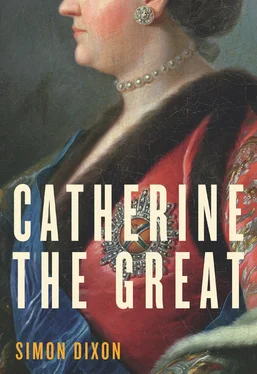The first indications of a third pregnancy showed in February 1754. In view of the earlier miscarriages, anxieties about Catherine’s health were understandable. The empress herself paid her a visit in Easter week, perhaps to check that Saltykov was not lurking in her apartments. She left after half an hour, having excused the grand duchess from appearing in public on her birthday and on coronation day. 112That was small relief by comparison with the distress caused by the discovery that Nikolay Choglokov, who collapsed during the Easter service, was terminally ill. It had taken Catherine seven years to bring the Choglokovs round by flattering them and pandering to their weakness for gambling. Now Nikolay had selfishly chosen to die ‘just at the point when we had managed, after several years of trouble and effort, to make him less wicked and nasty, and he had become more tractable’. As for his wife, she too ‘had changed from a hard-hearted and malevolent Argus into a firm and devoted friend’. Now they were gone, and at the moment of her greatest uncertainty Catherine had to face the future under the supervision of a new governor of the Young Court: Alexander Shuvalov, the head of the Secret Chancellery. Finding it astonishing that ‘a man with such a hideous grimace’ should have been placed in the company of a pregnant young woman, she cried all the way back to St Petersburg. 113
CHAPTER FOUR
Ambition
1754–1759
When Catherine finally gave birth to a son on 20 September 1754, the Russian Court erupted in an explosion of relief whose tremors were felt across the continent. The British minister in Florence, Sir Horace Mann, wrote in December:
All Europe seems to have agreed for some months past to do nothing worth talking of—except the Great Prince of Russia, who has made a little Great Prince to exclude forever the lawful Czar [Ivan VI, still imprisoned at Schlüsselburg], and for whose birth the Empress has given such presents, and made such rejoicings, both at home and abroad, as quite outdo those on the birth of an heir to the French monarchy. 1
It was a pardonable exaggeration. Among the courtiers who competed to stage celebrations in Elizabeth’s honour in a series of festivities lasting through the New Year carnival, none could surpass her young favourite, Ivan Shuvalov, who hosted a public masquerade that lasted for two whole days and nights in the last week of October, beginning and ending with allegorical fireworks. 2The scale of the empress’s own accession-day celebrations on 25 November can be judged from the tally of candles alone. In addition to 4000 plain white sticks for the chandeliers and 300 table candles of unspecified weight, the Court accountants recorded 1642 ‘semi-banquet’ candles and 1505 ‘ordinary’ ones weighing almost 900 lbs. Some 725 of these were used for the seven flaming pyramids designed by Rastrelli, who excelled himself by requiring 4000 glass bottles for their construction. 3
In contrast to such unrestrained public rejoicing, Catherine had been abandoned in miserable isolation. On her return from Moscow, she had been disconcerted to find that the apartment being prepared for her confinement was in Elizabeth’s wing of the Summer Palace, where she was later to remember two sombre rooms, ‘badly done out with crimson damask, and with almost no furniture or comfort of any kind’. The reason for their location was confirmed when her child was taken from her at the end of a difficult labour lasting from two in the morning until midday. Catherine’s room was cold and draughty, and since no one dared to change her linen without orders from the empress, she was left to writhe in blood-stained sheets soaked with sweat. At the baptism on 25 September, when the baby was christened Paul, it was the fifty-four-year-old Princess of Hesse-Homburg (née Anna Trubetskaya), flanked by Ober-hofmeister Shepelëv and General Alexander Shuvalov, who carried him into the palace chapel behind Grand Duke Peter and the empress. Catherine could learn of him only ‘furtively’, because ‘asking for news would have been interpreted as casting doubt on the care the empress was taking of him, and would have been very badly received’. By the following Easter, she had seen her son on only three occasions, the first being the forty-day churching ceremony to celebrate the end of her confinement, when she was too weak even to stand for prayers. Paul’s upbringing for the first eight years of his life was almost entirely in Elizabeth’s hands. 4
Anxious about the stifling conditions in which the swaddled child was kept, bathed in sweat in a cradle lined with the fur of a silver fox, Catherine descended into post-natal depression. Her mood sank lower still with the news that Sergey Saltykov had been sent abroad on the pretext of announcing Paul’s birth to the Court of Stockholm. (Later he was dispatched to Hamburg, showing every sign of having tired of their relationship.) Whether Saltykov was Paul’s father is a mystery that will never be resolved. Catherine’s memoirs hint strongly that he was, much to the horror of her nineteenth-century descendants who struggled to censor such an explosive revelation, and it is striking that Grand Duke Peter sired no other child, in spite of his many dalliances. Perhaps he was simply infertile. On the other hand, Catherine’s memoir may have been a rhetorical way of disinheriting her deposed husband rather than a confident biological claim. Paul certainly grew up to look and behave very much like Peter (puny, snub-nosed and prone to rage) and always revered him as his father. Amid all this circumstantial evidence, one thing is certain: Paul’s birth did nothing to reconcile Peter with Catherine. While the grand duke sought comfort in an affair with the unprepossessing Elizabeth Vorontsova, his wife looked out for a new companion of her own.
She found him in Count Stanislaw August Poniatowski, a twenty-three-year-old Polish aristocrat who came to Russia in June 1755 in the entourage of the new British ambassador, Sir Charles Hanbury-Williams. Having befriended Stanislaw in Berlin in 1750, Williams took him under his wing, introducing him first to the Court at Dresden and later to some of the best company in Europe as together they visited Vienna, Hanover and The Hague in 1753. A classic man of his times, equally at home with the bawdy Hellfire Club and the refinements of Latin verse, Sir Charles set out to polish Stanislaw’s manners and broaden his mind, grooming his young protégé for the most enlightened circles in Paris. There his admittance was guaranteed thanks to the renown of a father who had fought with Charles XII against Peter the Great at Poltava and was praised by Voltaire as a ‘man of extraordinary merit’. At the literary salon presided over by Madame Geoffrin, herself the uneducated daughter of a footman, Stanislaw met Montesquieu. And it was Montesquieu’s thirty-two-year-old friend Charles Yorke who became his leading companion during his visit to England in 1754, when Williams was distracted by the demands of a Parliamentary election. A Fellow of the Royal Society whose library boasted some of the latest works of the French Enlightenment, Yorke introduced the young Pole to the pleasures of the English landscape and took him to Salisbury, Bath, Oxford and Stowe. With Yakov Sievers, a youthful secretary at the Russian embassy who later became one of Catherine’s most influential advisers, he went to the debtors’ prison in London to see Theodore I, the deposed self-proclaimed king of Corsica. Having sampled everything in England from Shakespeare to cock fighting, Stanislaw arrived in Russia equipped with a cosmopolitan ease of manner in the company of an avuncular ambassador with a talent for gaining the trust of the young. 5
Catherine instinctively liked them both. While Sir Charles became her confidant (it was for him that she wrote her first memoir), Stanislaw became her lover. He offered her a seductive combination of wit, bookishness and sensitivity that her husband so obviously lacked. Hesitant at first—perhaps because he was a virgin (as he later liked to suggest), or more probably because he was understandably wary of the consequences—he eventually succumbed to her advances at the end of December. Like so many royal romances before and since, their affair began with furtive visits to her apartments and continued with secret assignations, fraught with risk, in the houses of complicit friends and courtiers. Catherine had to be smuggled in and out dressed as a man. Such a relationship was too precarious to survive for long, but while it lasted they made each other deliriously happy. ‘I did not think that I was made to love women,’ Stanislaw confessed in the revealing self-portrait he composed at her request. ‘I attributed the first attempts I made in that direction to particular circumstance, but then, at last, I found tenderness, and [now] I love with such passion that I feel that were my love to suffer any reverse I should become the most miserable man on earth.’ 6Apart from ‘a mouth which seemed to invite kisses’, he later remembered the attractions of a mind capable of shifting effortlessly from madcap, childish games to complex arithmetical puzzles. In his handsome company, Catherine found the confidence to build a new life of her own.
Читать дальше












